 Go to A-Z Databases: Books & eBooks to search for more eBooks. Must be on campus or login with your COM account for off campus access.
Go to A-Z Databases: Books & eBooks to search for more eBooks. Must be on campus or login with your COM account for off campus access.
Want more on finding books or eBooks? Try our How to Use Books & eBooks guides.
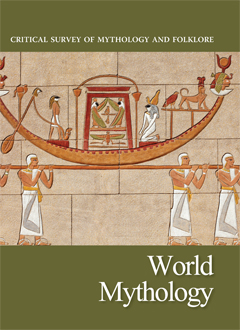 Critical Survey of Mythology and Folklore: World Mythology
Myths in the volume are organized by regions of the world and cultures, such as Oceania, South East Asia, and Meso-America. In addition, twelve maps listing ancient cultures and charts on mythological figures will provide a broad overview of major deities in world mythology. Students, educators, and general readers will discover a broad critical and cultural survey that engages the contemporary imagination in the importance of myth, fairy tale, and other traditional literature.
Critical Survey of Mythology and Folklore: World Mythology
Myths in the volume are organized by regions of the world and cultures, such as Oceania, South East Asia, and Meso-America. In addition, twelve maps listing ancient cultures and charts on mythological figures will provide a broad overview of major deities in world mythology. Students, educators, and general readers will discover a broad critical and cultural survey that engages the contemporary imagination in the importance of myth, fairy tale, and other traditional literature.
 Critical Terms for Religious Studies
Provides a concise history of each critical term, explores the issues raised by the term, and puts the term to use in an analysis of a religious work, practice, or event. Moving across Judaism, Christianity, Hinduism, Buddhism, Islam, and Native American and Mayan religions, contributors explore terms ranging from experience, territory, and image, to God, sacrifice, and transgression.
Critical Terms for Religious Studies
Provides a concise history of each critical term, explores the issues raised by the term, and puts the term to use in an analysis of a religious work, practice, or event. Moving across Judaism, Christianity, Hinduism, Buddhism, Islam, and Native American and Mayan religions, contributors explore terms ranging from experience, territory, and image, to God, sacrifice, and transgression.
 Critical Terms for the Study of Buddhism
Provides a unique introduction to Buddhism by examining categories essential for a nuanced understanding of its traditions.
Critical Terms for the Study of Buddhism
Provides a unique introduction to Buddhism by examining categories essential for a nuanced understanding of its traditions.
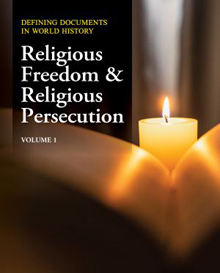 Defining Documents in World History: Religious Freedom and Religious Persecution
As divisive as it can be, religion is sacred to millions of people, and they hold dearly to their freedom to practice their religion of choice. Throughout history, instances of both the toleration of other faiths and the persecution of religious minorities have taken place.
Defining Documents in World History: Religious Freedom and Religious Persecution
As divisive as it can be, religion is sacred to millions of people, and they hold dearly to their freedom to practice their religion of choice. Throughout history, instances of both the toleration of other faiths and the persecution of religious minorities have taken place.
 Dictionary of Hindu Lore and Legend
Provides accessible, informative and authoritative entries to answer any major question about Hinduism, its mythology, practices, customs and laws.
Dictionary of Hindu Lore and Legend
Provides accessible, informative and authoritative entries to answer any major question about Hinduism, its mythology, practices, customs and laws.
 Dictionary of Jewish Lore and Legend
Provides a clear and systematic guide to a rich heritage of legend, folklore and tradition that is crucial to understanding Judaism. It describes the main characters and the tales that have grown up around them; Jewish methods of Biblical interpretation; the framework of Jewish law, literature and poetry; the festivals of the Jewish Year; the different languages and sub-groups within the Jewish community; and the many countries in which Jews have lived, as well as the importance of the Holy Land.
Dictionary of Jewish Lore and Legend
Provides a clear and systematic guide to a rich heritage of legend, folklore and tradition that is crucial to understanding Judaism. It describes the main characters and the tales that have grown up around them; Jewish methods of Biblical interpretation; the framework of Jewish law, literature and poetry; the festivals of the Jewish Year; the different languages and sub-groups within the Jewish community; and the many countries in which Jews have lived, as well as the importance of the Holy Land.
 Macmillan Dictionary of the Bible
A quick-reference guide to the Bible. Entries consist of the main people, places, customs, religious and cultural aspects, events, and institutions of the Bible.
Macmillan Dictionary of the Bible
A quick-reference guide to the Bible. Entries consist of the main people, places, customs, religious and cultural aspects, events, and institutions of the Bible.
 Need to Know? Islam
Essential overview for everyone who wants to understand what Islam is and what it means today.
Need to Know? Islam
Essential overview for everyone who wants to understand what Islam is and what it means today.
 The New Encyclopedia of Judaism
Includes hundreds of special articles covering subjects in analytical depth, as well as short biographies of the major figures in the story of Judaism.
The New Encyclopedia of Judaism
Includes hundreds of special articles covering subjects in analytical depth, as well as short biographies of the major figures in the story of Judaism.
![]()
Go to OneSearch to search for more print books.
Want more on finding print books? Try our How to Use OneSearch guide.
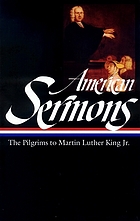 American Sermons: The Pilgrims to Martin Luther King, Jr.
The sermon is the first and most enduring genre of American literature. At the center of the Puritan experience, it continued in succeeding centuries to play a vital role—as public ritual, occasion for passion and reflection, and, not least, popular entertainment. The fifty-eight sermons collected in this volume display the form’s eloquence, intellectual rigor, and spiritual fervor. Ranging from the first New England settlements to mass-media evangelism and the civil rights movement in the 1960s, these texts reclaim a neglected American tradition.
American Sermons: The Pilgrims to Martin Luther King, Jr.
The sermon is the first and most enduring genre of American literature. At the center of the Puritan experience, it continued in succeeding centuries to play a vital role—as public ritual, occasion for passion and reflection, and, not least, popular entertainment. The fifty-eight sermons collected in this volume display the form’s eloquence, intellectual rigor, and spiritual fervor. Ranging from the first New England settlements to mass-media evangelism and the civil rights movement in the 1960s, these texts reclaim a neglected American tradition.
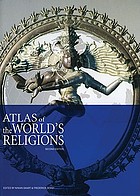 Atlas of the World's Religions
This superbly illustrated and organized reference source is the first comprehensive visual guide to the world's religious traditions. With text by leading experts, and lavishly illustrated with photographs, thematic maps, site reconstructions, and tables and charts, many in full color, the Atlas charts the origin, growth, and spread of all major faiths. A survey of contemporary religious life, its historical background, and a glossary, index, and list of resources enhance the research value of the book
Atlas of the World's Religions
This superbly illustrated and organized reference source is the first comprehensive visual guide to the world's religious traditions. With text by leading experts, and lavishly illustrated with photographs, thematic maps, site reconstructions, and tables and charts, many in full color, the Atlas charts the origin, growth, and spread of all major faiths. A survey of contemporary religious life, its historical background, and a glossary, index, and list of resources enhance the research value of the book
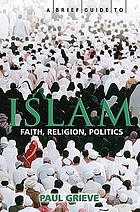 A Brief Guide to Islam: History, Faith and Politics
Differences and conflicts make for sensational headlines, but A Brief Guide to Islam starts with the similarities between the major Abrahamic faiths of Judaism, Christianity and Islam. Only then can the differences be understood. By exploring the beliefs, history and politics of the ordinary people of Muslim countries, Paul Grieve offers a fully comprehensive survey that combines authoritative analysis with carefully chosen primary sources.
A Brief Guide to Islam: History, Faith and Politics
Differences and conflicts make for sensational headlines, but A Brief Guide to Islam starts with the similarities between the major Abrahamic faiths of Judaism, Christianity and Islam. Only then can the differences be understood. By exploring the beliefs, history and politics of the ordinary people of Muslim countries, Paul Grieve offers a fully comprehensive survey that combines authoritative analysis with carefully chosen primary sources.
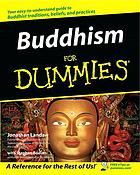 Buddhism for Dummies
Figuring Out Whether Buddhism Is a Religion -- Recognizing the Role of Buddha: The Awakened One -- Understanding the Philosophy of Buddhism -- Appreciating the Practice of Buddhism -- Dedicating Your Life to the Benefit of All Beings -- Understanding Your Mind: The Creator of All Experience -- Recognizing How Your Mind Shapes Your Experience -- Contrasting the Body and Mind -- Approaching the Mind from Three Different Buddhist Perspectives -- Identifying Some Ways Your Mind Works -- Appreciating the Fundamental Purity of Your Mind -- Tracing the Path of Wisdom and Loving-Compassion
Buddhism for Dummies
Figuring Out Whether Buddhism Is a Religion -- Recognizing the Role of Buddha: The Awakened One -- Understanding the Philosophy of Buddhism -- Appreciating the Practice of Buddhism -- Dedicating Your Life to the Benefit of All Beings -- Understanding Your Mind: The Creator of All Experience -- Recognizing How Your Mind Shapes Your Experience -- Contrasting the Body and Mind -- Approaching the Mind from Three Different Buddhist Perspectives -- Identifying Some Ways Your Mind Works -- Appreciating the Fundamental Purity of Your Mind -- Tracing the Path of Wisdom and Loving-Compassion
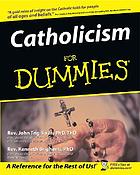 Catholicism for Dummies
There are more than one billion Catholics in the world, and each one has a similar set of basic beliefs and practices that he or she follows. Some of the teachings of Catholicism are thousands of years old, while others are more recent. So what is the Catholic culture like and what do they believe? Catholicism For Dummies answers these and many other questions.
Catholicism for Dummies
There are more than one billion Catholics in the world, and each one has a similar set of basic beliefs and practices that he or she follows. Some of the teachings of Catholicism are thousands of years old, while others are more recent. So what is the Catholic culture like and what do they believe? Catholicism For Dummies answers these and many other questions.
 Creation Myth
Focuses on stories about the origin of the cosmos and of human life, with more than 400 entries divided into Myths and Stories, Gods and Goddesses, and Selected Sources and Authors.
Creation Myth
Focuses on stories about the origin of the cosmos and of human life, with more than 400 entries divided into Myths and Stories, Gods and Goddesses, and Selected Sources and Authors.
 Featured resources are specialized or unique resources. Must be on campus or login with your COM account for off campus access.
Featured resources are specialized or unique resources. Must be on campus or login with your COM account for off campus access.
Oxford's Very Short Introductions offer concise introductions that are balanced, demonstrating how it has developed and influenced society. COm Library has some in print and some eBooks. See more Very Short Introductions.
© 2024 COM Library
1200 Amburn Road, Texas City, Texas 77591
409-933-8448 . FAX 409-933-8030
This work is licensed under a Creative Commons Attribution-NonCommercial 4.0 International License